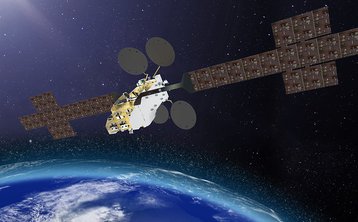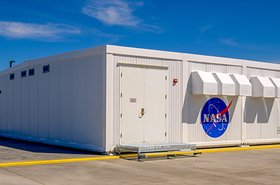Geostationary (GEO) satellite operator Eutelsat has closed its acquisition of Low Earth Orbit (LEO) operator OneWeb.
EuroNext Paris-listed Eutelsat Communications SA this week announced the completion of its all-share combination with OneWeb following the approval today at the Ordinary and Extraordinary General Meeting of Eutelsat shareholders.
Plans to merge the two companies were announced in July 2022. The new combined company is known as Eutelsat Group. The company is the only satellite firm operating in both GEO and LEO – though SES operates in GEO and medium Earth orbit (MEO).
Eutelsat will remain headquartered in Pars with OneWeb as a London-based subsidiary operating commercially as Eutelsat OneWeb.
Eutelsat remains listed on the Euronext Paris Stock Exchange and has applied for standard listing on the London Stock Exchange.
Eva Berneke, Eutelsat CEO, said: “Eutelsat Group is the only GEO-LEO operator in satellite communications that can offer a ubiquitous connectivity service. The Eutelsat-OneWeb combination has given us the scale, financial strength, and business proposition to capitalize on the significant opportunity.”
The European Telecommunications Satellite Organization was originally set up in 1977 by 17 European countries. The company launched its first satellite in 1983 and today operates 36 GEO satellites.
OneWeb was founded in 2012 under the name WorldVu. Despite declaring bankruptcy in 2020, the company has now launched more than 630 satellites and is set to launch global services later this year.
OneWeb this month announced plans for a new ground station in Saudi Arabia. First Tech Web Company Limited – the company’s joint venture with Neom’s Tonomous – announced it had selected Albabtain LeBlanc to construct a satellite network portal in Tabuk. The station is expected to be completed by the end of 2023.
Eutelsat this week announces a partnership with Can Marine Systems, a provider of maritime systems in Asia. Can Marine will offer Eutelsat’s combined GEO/LEO connectivity services to its customers.
In other satellite news:
- SpaceX has won its first customer for its government-focused Starshield network. The US Space Force has awarded a one-year contract for Starshield with a maximum value of $70 million.
Announced last year, Starshield is described as a “secured satellite network for government entities.”
Air Force spokeswoman Ann Stefanek, told Bloomberg the contract covers “Starshield end-to-end service via the Starlink constellation, user terminals, ancillary equipment, network management, and other related services.”
In a recent X post, SpaceX CEO Elon Musk said: “Starlink needs to be a civilian network, not a participant to combat. Starshield will be owned by the US government and controlled by DoD Space Force.”
- Paratus has signed a reseller agreement with Starlink for Africa, starting with Mozambique, Kenya, Rwanda, and Nigeria. Paratus is already a OneWeb distributor.
- Maritime shipping company Hapag-Lloyd is to roll out Starlink across its entire fleet after a successful pilot on four vessels.
- Yahsat has won a $5.1 billion, 17-year satellite services contract with the UAE government. Yahsat will provide the government with satellite capacity using the Al Yah 1 and Al Yah 2 satellites, as well as via two new satellites due to be launched by 2028.
- O2 Germany is to offer satellite-based IoT connectivity from next year in partnership with Skylo.
- Huawei’s new Mate 60 Pro phone has direct-to-cell satellite connectivity via China Telecom, which relies on three satellites from Tiantong.
- Iliad-owned Altice Portugal is to reactivate a ground station on the Azores islands. The company is partnering with space radar firm Thoth Technology to convert a 30-meter antenna on the island of São Miguel to monitor space traffic.







